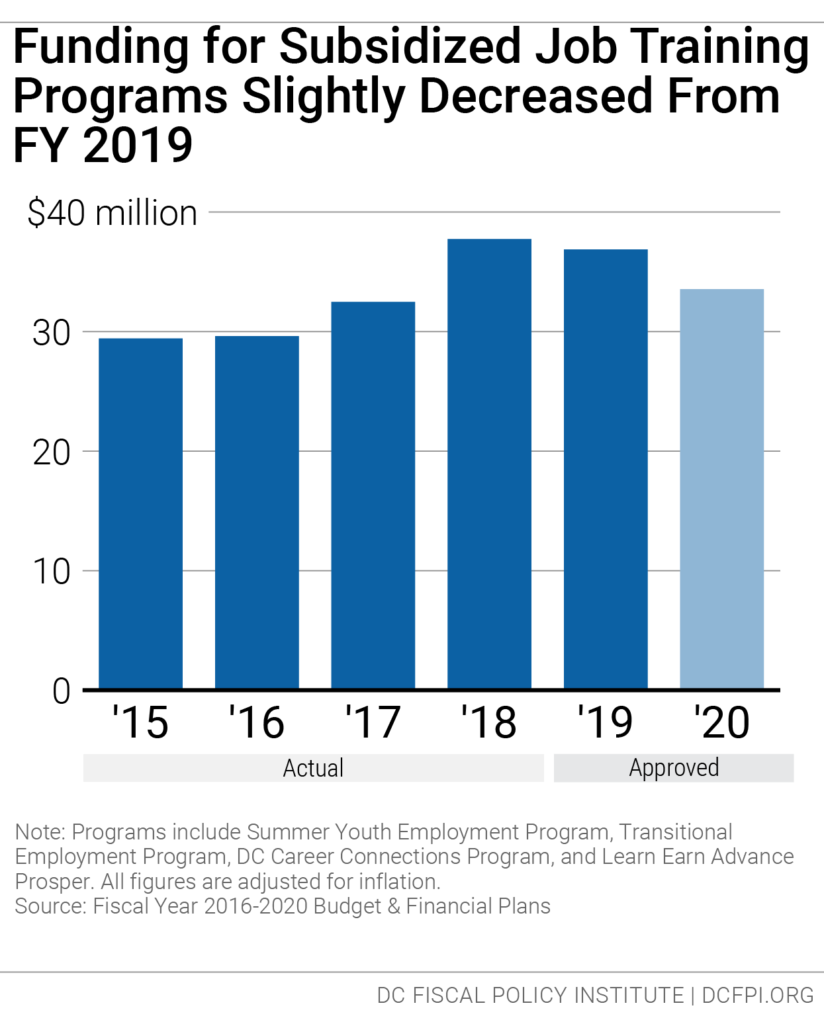Summary:
- $3.3 million in total funding for the DC Infrastructure Academy, including $2.6 million in local dollars
- $9.4 million to support start of the Paid Family and Medical Leave program in FY 2020
- $250,000 to continue the Aspire to Entrepreneurship training program for returning citizens
- $300,000 to continue Dream Grants, a micro-loan program for small business entrepreneurs in Wards 7 and 8
- $2.15 million for the Career Pathways Innovation Fund, an increase from $1.5 million
- $4.2 million for the Office of Adults & Family Education, a slight decrease from $4.4 million, and $656,000 for the Reengagement Center (REC)
The District’s approved budget for fiscal year (FY) 2020 largely maintains support for DC’s key employment training and entrepreneurship programs. The Department of Employment Services’ (DOES) gross budget slightly increased, due partially to an increase in federal funding. The District converted some of the agency’s recurring local funds for employment services to one-time funding. The budget also includes additional funds for the Paid Family Leave program that will start providing benefits in FY 2020. While the proposed budget failed to fund the Career Pathways Innovation Fund, the approved budget ultimately restored and expanded its funding.
Slight Reductions in Subsidized Job Programs
The approved budget continues to make investments in DC’s four main subsidized job training programs, but at slightly lower levels than last year (Figure 1). Overall, funding for the four programs will be $33.5 million in FY 2020, compared with $37 million in FY 2019 when adjusted for inflation. In the Approved FY 2020 Budget Toolkit, DCFPI uses the most up-to-date inflation data, which is more current than the data that we used for the Proposed FY 2020 Budget Toolkit. As such, some figures may have slightly changed.[i]
The Mayor Marion S. Barry Summer Youth Employment Program (MBSYEP), which is locally funded, provides District youth with summer work experiences through subsidized placements in the private and government sectors. The $18.5 million budget for MBSYEP includes a wage increase for people aged 22 to 24 and one-time stipends for youth aged 14 to 15. However, since the Kids Ride Free program was extended to additional District students and many participants are now covered by the program, MBSYEP’s budget no longer needs to include transportation assistance. The costs of the wage increases are more than offset by the savings in transportation assistance, so overall funding for the program is actually lower than last year’s $19.2 million. While the wage increase for people aged 22 to 24 is an important step forward, additional funding is necessary to support a permanent wage increase for younger participants and expand access to year-round opportunities.
The Transitional Employment Program (also called Project Empowerment) is a subsidized job program specifically targeted to returning citizens and others with high barriers to employment. The approved budget invests $9.7 million for FY 2020, compared with $10.6 million for FY 2019 when adjusted for inflation.
The DC Career Connections Program is a work readiness program that started in FY 2017 and is specifically targeted to youth aged 20 to 24. The approved budget reduces funding for this program to $3.7 million in FY 2020 from $4.4 million in FY 2019 when adjusted for inflation.
Learn Earn Advance Prosper Academy began in 2016 as a training and subsidized employment program for jobs in DC government and is specifically targeted to long-term TANF recipients. The approved budget includes $1.6 million in FY 2020 from $2 million in FY 2019 when adjusted for inflation.

Figure 1.
Funding Change for Infrastructure Academy
The DC Infrastructure Academy (DCIA) is a partnership between the District government, organized labor, the University of DC, and private sector employers. DCIA provides job training for underemployed and unemployed residents focused on the infrastructure industry. The FY 2020 budget reduces local spending for DCIA to $2.6 million from $3.6 million in FY 2019 when adjusted for inflation, and it converts funding from a recurring basis to a one-time basis going forward. Of the $2.6 million budget, $300,000 came directly from the DC Council’s decision to recapture tax cuts from scaling back the Qualified High Technology Company tax abatement program.
Increase to Support Start of Paid Family Leave
In December 2016, the DC Council passed the Universal Paid Leave Act (UPLA), which will provide up to eight weeks of parental leave to bond with a new child, six weeks of family leave to care for an ill family member with a serious health condition, and two weeks of medical leave to care for one’s own serious health condition. The program is not open to District government employees, who already receive paid family leave, or federal government employees. The program will start providing benefits in July 2020, part-way through FY 2020.
The approved budget for FY 2019 provided $5.2 million (when adjusted for inflation) for implementation and $40 million in capital costs through 2023. The FY 2020 budget increases the budget amount for implementation to $9.4 million to address staffing needs and administration costs as the program starts operating. The program’s benefits and operations will eventually be self-funded through a payroll tax. Tax collection commenced on July 1, 2019 to build up funds in anticipation of the start of benefits in July 2020.
Increase in Support for Entrepreneurs
Within the Department of Small and Local Business Development (DSLBD), the approved budget increases support for Dream Grants — a micro loan program providing grants of up to $10,000 for small business entrepreneurs. This $300,000 investment, an increase of $95,400 from FY 2019 when adjusted for inflation, aims to specifically support small business entrepreneurs in Wards 7 and 8, some of whom can face difficulties fairly competing to win lucrative city contracts.[2] To date, DSLBD has awarded $300,000 to over 30 grantees. The focus on Wards 7 and 8 is further supplemented by an Office of East of the River Services, established by Mayor Bowser in January to address challenges faced by District residents from those wards.
The approved budget also includes $250,000 in assistance to returning citizens through the Aspire to Entrepreneurship program, which provides returning citizens with training to assist in business creation. This program, first piloted in 2016, partners with Project Empowerment to provide program participants a stipend for the duration of the six-month training. Businesses developed by past participants include childcare centers, restaurants, trash hauling, landscaping services, event planning and mental health and wellness centers.
Transportation Subsidies to Adult Learners and Re-engaging Youth Increased
For the first time in three years, the approved budget increased transportation assistance to adults in publicly funded education programs. The subsidy will increase from $50 per month to $70 per month to cover Metrobus and Metrorail rides for program participants.[3] This investment is crucial as transportation has repeatedly been identified as a major barrier to program participation.[4] The approved budget includes an additional $200,000 to cover the cost of the subsidy increase, bringing the program total to $2.1 million within the District Department of Transportation.[5]
Continued Local Support for Adult Education, But Cut in Federal Funds
The Office of the State Superintendent of Education’s Post-Secondary and Career Education Division includes two programs – the Office of Adult & Family Education (AFE) and the Reengagement Center (REC) – that support adults in accessing education and career opportunities. AFE supports adult learners in increasing literacy levels, obtaining a GED, and accessing post-secondary school or job training. Local funding for AFE slightly decreased to $4.2 million in FY 2020 from $4.4 million in FY 2019, while federal funding decreased by over $700,000. The REC provides educational opportunities and support services for youth and young adults aged 16 to 24. The approved budget for the REC is $656,000, an increase of $34,000 from last year.
Career Pathways Innovation Fund Restored & Expanded
The federal Workforce Innovation and Opportunity Act (WIOA) mandates that states align workforce programs to career pathways – coordinated, transparent education and training systems that adults can easily access for their specific training needs. To support adult education and workforce providers in meeting WIOA mandates, the DC Council created a $1.5 million Career Pathways Innovation Fund (CPIF) in FY 2016 ($1.6 million when adjusted for inflation). Last year, the DC Council restored $1.5 million for the CPIF after a proposed cut. This year, the proposed budget again excluded funding for the CPIF, but the Council restored and expanded funding to a total of $2.15 million – $1.65 million is recurring while $500,000 is one-time funding. As a result, the CPIF can serve approximately 150 more individuals than last year.
Steady Funding for the Workforce Investment Council (WIC)
The Workforce Investment Council (WIC) is tasked with supporting workforce education, training, and support services to promote job readiness and employment. The FY 2020 approved budget for the WIC is slightly lower ($4.95 million) but mostly consistent with last year’s funding levels ($5.1 million). The approved budget includes additional funding for the CPIF grants, $500,000 for a one-time extension of the DC Kitchen grant, $300,000 for one-time Internet technology and construction training outreach, and funding for additional staff.
[i] In the Approved FY 2020 Budget Toolkit, DCFPI uses the most up-to-date inflation data, which is more current than the data that we used for the Proposed FY 2020 Budget Toolkit. As such, some figures may have slightly changed.
[2] Morgan Baskin, A ‘Preference Points’ System Was Supposed to Help a Ward 8 Business Owner. It Didn’t. Washington City Paper, January 31, 2019.
[3] DC Council Committee of the Whole Report on Bill 23-208, the “Fiscal Year 2020 Local Budget Act of 2019” (2019)
[4] According to learner listening sessions conducted in 2015 by the DC Adult and Family Literacy Coalition (AFLC) and Fair Budget Coalition. In addition, over a third of 1,000 adult learners surveyed in 2016 by the Deputy Mayor for Education’s (DME) office reported their biggest transportation concern is its cost. Adult learner providers also testified in 2019 that the $50 per month stipend was still insufficient.
[5] DC Council Committee of the Whole Report on Bill 23-208, the “Fiscal Year 2020 Local Budget Act of 2019” (2019)



